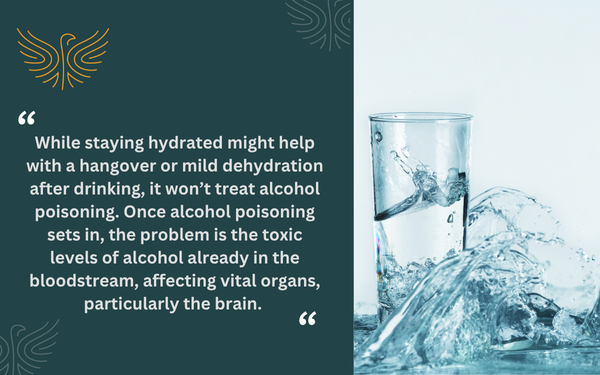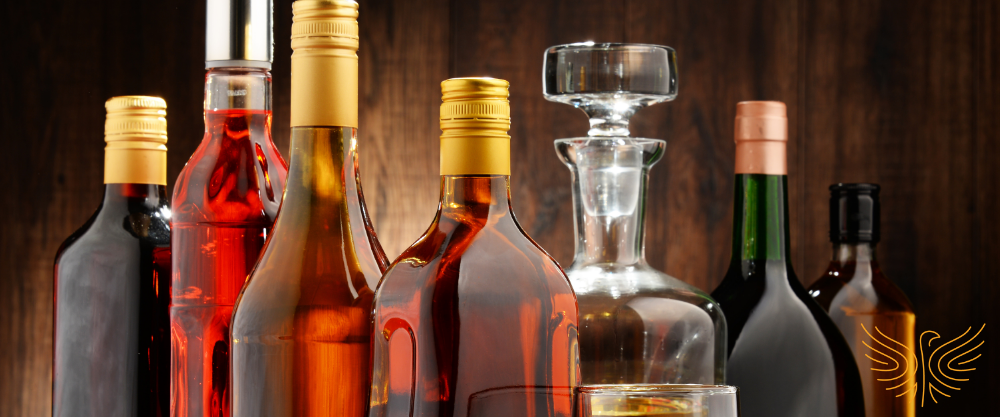According to the Centers for Disease Control and Prevention, six people in the United States die each day from alcohol poisoning - amounting to about 2200 deaths per year.
Alcohol poisoning happens when someone drinks a large amount of alcohol in a short time, and the body can’t process it quickly enough1. In fact, it signals a serious medical emergency. But knowing the difference between someone who’s just had too much to drink and someone with alcohol poisoning can be the difference between life and death. Keep reading to learn more.
_______________________________________________________
What Is Alcohol Poisoning?
Alcohol poisoning is a severe and potentially deadly consequence of drinking too much alcohol too quickly. Unlike simply being intoxicated, alcohol poisoning occurs when blood alcohol concentration (BAC) reaches toxic levels that can shut down critical areas of the brain that control breathing, heart rate, and body temperature2. When this happens, it’s a medical emergency requiring immediate intervention.
Do I Have Alcohol Poisoning or a Bad Hangover?
A hangover typically begins after alcohol has mostly left your system, usually the morning after drinking. Symptoms include a headache, fatigue, dehydration, nausea, sensitivity to light and sound, and general discomfort3. Though unpleasant, these symptoms aren’t immediately life-threatening and gradually improve over time.
Alcohol poisoning, in contrast, happens while alcohol is still actively in your bloodstream at dangerous levels. It presents with severe, potentially fatal symptoms such as confusion, vomiting, seizures, slow or irregular breathing, blue-tinged or pale skin, low body temperature, and unconsciousness or inability to wake up4. These symptoms appear during or shortly after drinking, not the next day.
Common Signs of Alcohol Poisoning
So, what should you watch out for? Here are the common signs:
- Confusion or stupor
- Vomiting
- Seizures
- Slow or irregular breathing
- Hypothermia (low body temperature)
- Pale or bluish skin
- Unconsciousness and inability to wake
If you notice someone has been drinking and is experiencing the signs above, call emergency medical services. Again, this could mean the difference between life and death.
_______________________________________________________
Does Drinking Water Help With Alcohol Poisoning?
In short, no, drinking water does not help with alcohol poisoning5.
While staying hydrated might help with a hangover or mild dehydration after drinking, it won’t treat alcohol poisoning. Once alcohol poisoning sets in, the problem is the toxic levels of alcohol already in the bloodstream, affecting vital organs, particularly the brain.

Unfortunately, drinking water doesn’t speed up the metabolism of alcohol via the liver, which occurs at a fixed rate of roughly one standard drink per hour. In other words, the body can’t simply flush out or dilute the alcohol that’s already been absorbed into the bloodstream.
Additionally, if someone is experiencing alcohol poisoning, they may be unconscious, seizing, or vomiting - all conditions that make drinking water dangerous due to choking or aspiration risks. Attempting to have someone drink water who is severely intoxicated could actually cause them to aspirate fluid into their lungs, creating additional life-threatening complications.
Medical attention is a requirement for treating alcohol poisoning6. Only professional medical care, which may include IV fluids, oxygen therapy, and careful monitoring of vital signs, can adequately address alcohol poisoning and prevent fatal outcomes.
_______________________________________________________
Prevention & Treatment for Alcohol Poisoning
The best way to treat alcohol poisoning is to prevent it from happening in the first place. Here’s how to do that:
- Drink responsibly: Know your limits and pace yourself. Avoid binge drinking, which significantly increases the risk of alcohol poisoning.
- Never mix alcohol with drugs or medications: Combining substances can amplify alcohol’s effects and increase the danger.
- Eat before and while drinking: Food slows the absorption of alcohol into the bloodstream.
- Stay informed and look out for others: If you’re drinking in a group, keep an eye on friends and speak up if someone shows warning signs.
Treatment for alcohol poisoning always requires medical attention. There is no at-home remedy or quick fix. In the emergency room, treatment may include:
- IV fluids to prevent dehydration
- Oxygen therapy
- Stomach pumping (in severe cases)
- Monitoring and support of vital functions
What To Do If You Suspect Alcohol Poisoning
If you believe someone has alcohol poisoning, take the following actions:
- Call 911 immediately: Do not hesitate or wait to see if symptoms improve. Alcohol poisoning is a medical emergency that requires professional treatment. Make the call even if the person protests or you feel embarrassed.
- Do not leave the person alone: Stay with them until medical help arrives. Their condition can deteriorate rapidly, and they may need assistance if they vomit or have a seizure.
- Keep them sitting up or on their side: If the person is conscious, try to keep them in an upright position. If they’re unconscious or semi-conscious, place them in the recovery position—on their side with their head turned to the side, knee bent forward to stabilize them, and airway clear. This helps prevent choking if they vomit.
- Monitor breathing and responsiveness: Continue checking their breathing and consciousness level while waiting for emergency services. If their breathing stops or becomes dangerously slow, and you’re trained in CPR, begin rescue procedures.
- Provide any information to paramedics: Tell emergency responders what and how much the person drank, when they had their last drink, and any symptoms you’ve observed.
How Long Does It Take to Recover from Alcohol Poisoning?
Recovery time can vary depending on the severity of the poisoning, how much alcohol was consumed, and how quickly the person received medical care. However, mild to moderate cases may take 24 to 48 hours to fully recover, with proper rest and hydration7.
On the other hand, severe cases that involve unconsciousness, seizures, or respiratory distress may require hospitalization and a more extended recovery period, potentially several days. In some cases, long-term effects like brain damage or organ dysfunction can occur, especially if treatment was delayed.
As mentioned above, the best way to treat alcohol poisoning is by stopping it from happening in the first place. Excessive and frequent drinking can put you at a higher risk of this life-threatening condition. If you’re struggling with alcohol use, Freedom Recovery Centers (FRC) can help. With our caring and compassionate team, you can learn healthier ways to cope, paving the way toward a happier and more vibrant life. Ready to get started? Call us at 804-635-3746 or fill out our online form.
.svg)






.svg)

.svg)



.svg)
